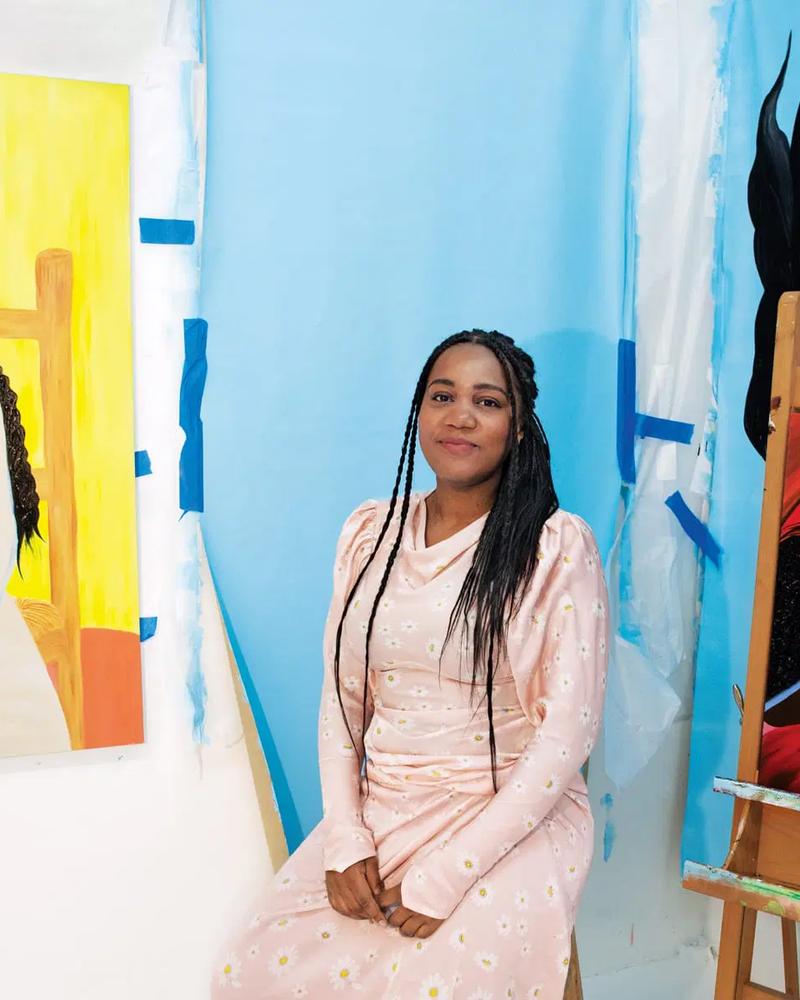Delphine Desane
Delphine Desane is a French contemporary painter and sculptor born and raised in Paris. Desane paints individuals, mostly women, of the African and Caribbean diaspora – portraits full of expression against vivid backgrounds, which exalt their inner state of mind. Desane’s brightly coloured and jewel-toned images of graceful Black women depict confidence, feminine power, and Black joy.
After her work was discovered on Instagram, Desane was commissioned to create a cover for the January 2020 issue of Vogue Italia. This seemingly simple portrait of a contemplative Black woman against a red background launched her into the global spotlight, as told to Maria Vogel (‘On the Heels of a “Vogue” Cover, Painter Delphine Desane Talks About What It’s Like to Break Through From Stylist to Art Star’, artnet.com, 20 October 2020): ‘Everything really took off when I was commissioned to paint the cover of the January 2020 Sustainability Issue of Vogue Italia alongside seven established artists.’
Desane originally studied at Studio Berçot (a nowadays defunct prestigious design school with many industry links and notable alumni), Paris, from where she graduated with a bachelor’s degree in fashion design in 2008. Following her graduation, Desane pursued a career as a fashion stylist, working with Vanessa Reid (often described as one of the defining voices of styling today; Reid’s female-centric and historically aware work spans titles such as Italian Vogue, M by Le Monde, Arena HOMME+ and Purple, alongside her long-standing position as fashion director at POP). Desane spent the first two and a half years working between Paris and London, after which she moved to Italy, working, as a creative visual merchandiser, for Miu Miu and Prada.
Having travelled extensively between Paris and New York Desane decided to relocate to New York,full-time where she supported herself as a freelance stylist. After ten years as a fashion stylist in Paris, Milan and NYC, she then took up painting (while on maternity leave from her job as a fashion stylist), and from there on her career changed paths, as told by Desane in the Vogel interview:
I started painting after I gave birth to my son Gaspard, who is now three years old. It really started as a therapeutic practice for me. It was a way to cope with the stress and the postpartum [depression]. I had wanted to change careers for years, and moving over to painting was the most natural transition for me. I don’t have any academic training in painting—I didn’t go to art school for it per se. I’ve learned by observation and practice, and have been going to museums and galleries for as long as I can remember. Growing up in Paris, you are surrounded by art and beautiful architecture; you can’t escape it. I felt the same when I was living in Italy, but it took me a while to realize how Europe really shaped my aesthetic. After moving to the US and traveling back and forth to Europe, that’s when it really hit me.
The female figures in her paintings pop against mostly monochromatic backgrounds and draw in the viewer with their strong poses and direct gazes. She is inspired by her work in the fashion industry as well as her experiences as a Black mother, the daughter of Haitian immigrants, and (having lived and worked in New York, NY, U.S.A.) an immigrant herself, as pointed out by Desane in her 2020 interview:
The work has a lot to do with my own experiences as a Black woman, a Black mother, being an immigrant in the US, being a child of immigrant parents, and being French and Caribbean. I really try to incorporate all these elements in my painting. I might use a Fauvist palette sometimes, but my themes are very much about what’s happening in the world right now and what I have experienced: racial profiling and discrimination, but also Black joy and, most importantly, motherhood. Growing up, I didn’t really know who to look up to. There weren’t a lot of Black artists that we could reference. The only Black art that was part of my life was the Haitian paintings my mother had around the house. We didn’t have a Black power movement in France. I started to learn a lot about Black artists after I moved here. And needless to say, representation is important.
Desane has shown her work in two solo exhibitions at Luce Gallery, Turin, Italy: Dreams of a Dreamer (2021) and Refuge Poétique (2025). To this could be added various group exhibitions and art fairs including Black Voices/Black Microcosm, CFHILL, Stockholm (2020); A Peripheral Reverie, PENSKE projects, Los Angeles, California, U.S.A. (2020); Black Femme: Sovereign of WAP and the Virtual Realm, Canada Gallery, New York, NY, U.S.A. (2021); Contemporary Domesticity, Taymour Grahne Gallery, London (2021); Ghosts of Empires II, Ben Brown Fine Arts, London (2022); Aspen Art Fair, Luce Gallery, Aspen, Colorado, U.S.A. (2025); Dallas Art Fair, Luce Gallery, Dallas, Texas, U.S.A. and Felix Art Fair, Luce Gallery, Los Angeles, California, U.S.A. (2025).
In 2020 Desane also did a residency at the POCOAPOCO in Oaxaca, Mexico.
Her paintings are held in the collections of the Studio Museum in Harlem, New York, NY, U.S.A.; the Museum of African Contemporary Art Al Maaden, MACAAL, in Marrakech, Morocco; and numerous private collections across Europe and the United States.
Copyright Firestorm Foundation
